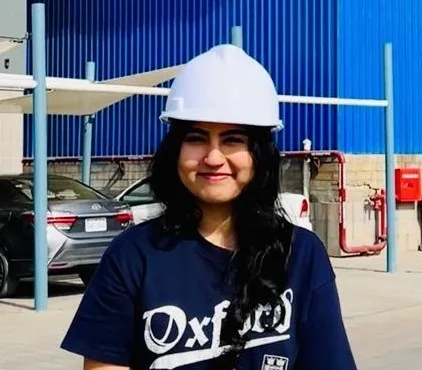
By Inaya Fawad – Jumeirah College
Growing up in the UAE with Canadian-Pakistani roots, my connection to Pakistan was always heartfelt yet somewhat distant. It wasn’t until I had the chance to intern there that I truly grasped the country’s struggles. The stark realities of hunger and poverty—things I had only read about—were no longer just statistics. They were etched on the faces of children, families, and entire communities fighting to survive.
What had once been a chapter in my social studies textbook became painfully real. I saw kids just like me—only they hadn’t been as lucky. That realization hit hard. I knew I couldn’t just look the other way and continue living my privileged life. I had to do something. But how? The question barely formed in my mind before the answer followed: I could use my passion for Chemistry to explore sustainable solutions to tackle food insecurity in Pakistan
Pakistan’s food security crisis is one of the most urgent issues of our time. Reports from the United Nations World Food Program (WFP) and the Food and Agriculture Organization (FAO) reveal troubling statistics:
But behind these numbers are real people—families who wake up every day unsure of where their next meal will come from. Tackling this crisis isn’t just a responsibility; it’s a necessity if we are to achieve the United Nations’ Sustainable Development Goal (SDG) of Zero Hunger by 2030.
Food insecurity in Pakistan is driven by a complex web of challenges:
Each of these issues demands targeted, innovative solutions that must be implemented with precision.
Despite the scale of the problem, there are ongoing efforts that offer hope:
My internships at Unity Foods and Sunridge Foods gave me a unique perspective on how science and social impact can intersect—and the incredible change that happens when science is used for the greater good. While working on projects aimed at enhancing the nutritional value of staple foods and streamlining production processes, I realized how underutilized chemistry is in Pakistan’s nutritional landscape. If applied to its full potential, it could directly combat food insecurity and improve the well-being of thousands.
One particular event still stands out vividly in my mind: I happened to meet Amina, a factory worker, who shared her dreams for her three children. She wanted her eldest to become a doctor so he could help people from his community while the younger two should pursue teaching, she thought Despite her optimism for their future, I could sense her doubt in her expressions. The pain in her eyes reflected the harsh reality of hunger and poverty that her children were facing on a day-to-day basis.
That conversation stayed with me. It pushed me to take action and ultimately sparked the idea for EcoChem Solutions: Nourishing Pakistan—a community initiative dedicated to sustainable, science-driven solutions to food security.
At EcoChem Solutions, our mission is simple yet profound: to use the power of chemistry to ensure every child in Pakistan wakes up to a full stomach and a bright future. Our objectives include:
Organizing workshops in schools and communities which focus on eco-friendly farming and nutrition. Additionally, using digital media to circulate important information about the latest practices in the agricultural industry.
Partnering with local NGOs and FMCG companies to distribute educational material on nutrition and sustainable agriculture practices. FMCG companies can be given incentives to hand out free samples of genetically modified seeds, herbicides etc. to encourage better farming practices. Lastly, creating internships and hand-on experiences with organizations focused on nutrition and agriculture.
Collaborating with schools and colleges on accessible research into eco-friendly fertilizers and practices. Getting students involved means creating future leaders who are aware of the importance of good agricultural practices for Pakistan.
Establishing science clubs in schools, with a special focus on STEM education for girls. Students need to understand the powerful role chemistry can play in changing the agricultural landscape of Pakistan.
Since I’ve started my journey, I’ve initiated several projects that integrate chemistry into sustainable food solutions:
From a curious student to an advocate for sustainable food solutions, my journey has taught me that while the challenges are immense, the potential for change is even greater. Scientific innovation, community engagement, and youth empowerment are powerful tools that can transform the food security landscape in Pakistan.
The road to Zero Hunger is not easy, but it is definitely achievable. Together, we can create a future where every child in Pakistan has access to the nutrition, they need to not just survive but also thrive. I invite you to join me on this life changing journey where we create new possibilities, explore underutilized potential and witness what seemed impossible. Every voice, action, and contribution matters. Together, let’s nourish Pakistan, one child at a time.
Dario Amodei, CEO of artificial intelligence firm Anthropic, finds himself at the center of a…
Abu Dhabi, 1 March 2026: The second Twenty20 match between Pakistan’s Shaheen contingent and England’s…
Princess Eugenie and Beatrice are in grave danger as rumors surrounding their parents, Sarah Ferguson…
Climate Change Throws a Curveball on Punjab’s Educational Activities Punjab's schools have been hit with…
Multiple social media users across platforms X, Facebook, LinkedIn, and various news sites in Iran…
Senator Tom Cotton, the chairman of the Senate Intelligence Committee, addressed Sunday's massive U.S.-Israeli military…
This website uses cookies.